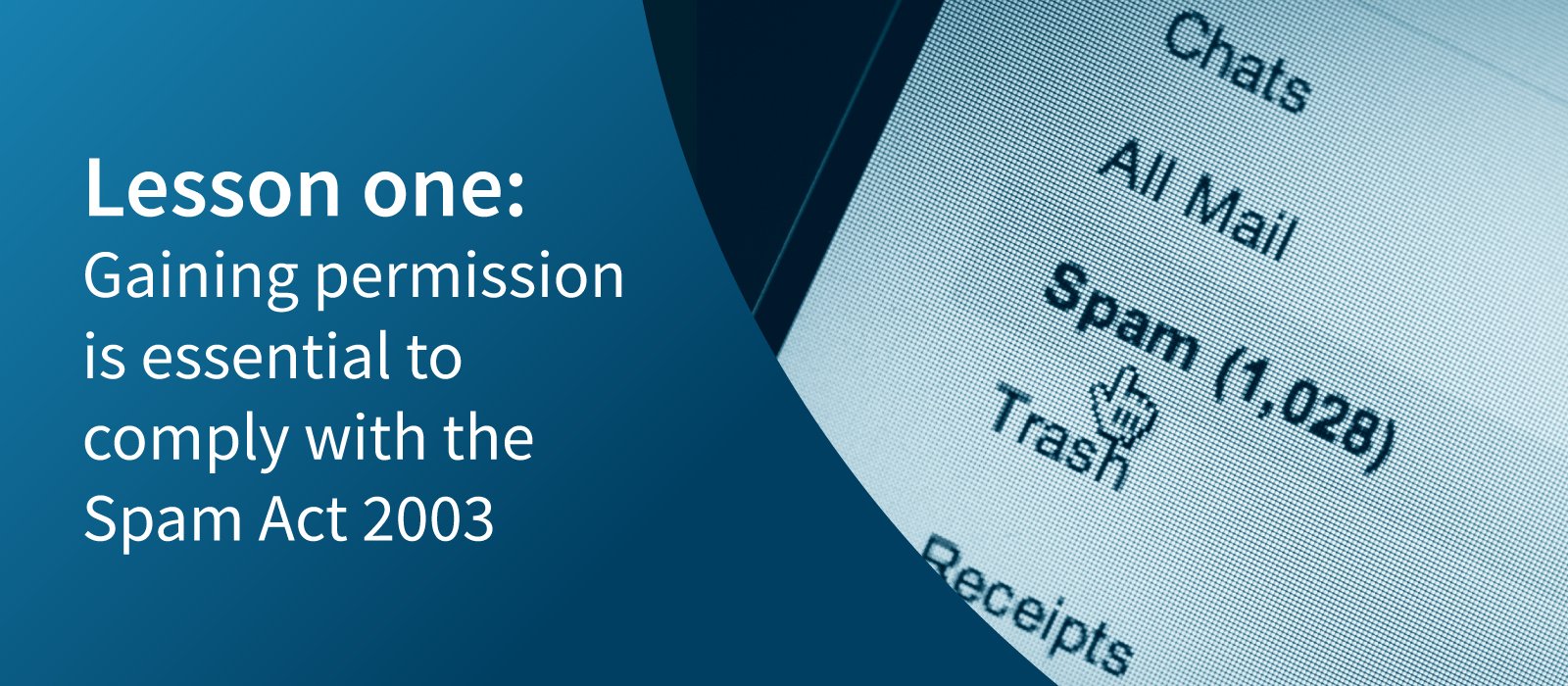Three common costly mistakes to avoid breaking the Spam Act 2003 when using purchased or rented email lists
Email has the potential to be a powerful marketing tool. It can effectively communicate with your target audience or current customers, share news and exciting company updates, provide success stories and use cases, and so much more. Essentially, it’s one of the most important tools, if not the most important, when it comes to nurturing leads.
When companies want to expand their reach and spread their message to a wider pool of potential leads, they often look to purchase or rent email lists from reputable providers.
However, when renting or purchasing email lists, marketers must be aware of their responsibilities under the Spam Act 2003. The Act was developed to regulate commercial electronic messages in Australia, including email and phone messages. It aims to restrict businesses from sending spam messages to both customers and non-customers and give people more power when it comes to businesses marketing to them.
There are three main elements of the Spam Act that marketers must adhere to:
- unsolicited commercial electronic messages must not be sent
- commercial electronic messages must include information about the individual or organisation who authorised the sending of the message
- commercial electronic messages must contain a functional unsubscribe facility.
Unfortunately, it can be easy to overlook one or more of these elements, particularly in the excitement of a new campaign or launch or when marketing teams are stretched to capacity.
Three of the most common mistakes marketers make when renting or purchasing email lists are:
- thinking that it’s not necessary to get permission from the people on the list to send them marketing emails (it is)
- assuming that purchasing or renting the list automatically comes with permission to contact the people on it via email (it doesn’t)
- believing the list providers are responsible for ensuring the people on the list have opted-in to receive marketing emails (they aren’t).
We’ve outlined in more detail the three lessons you need to learn when it comes to renting or purchasing email lists.
Lesson one: Gaining permission is essential to comply with the Spam Act

The Spam Act requires organisations to get permission from each person who will be contacted before sending any marketing correspondence, either via email or phone. Marketers can’t just send an electronic message asking for permission, though, as this is still seen as marketing. The Act classifies two types of permission: express and inferred.
Express permission is where the individual is aware that they are signing up to receive marketing materials from the business. This permission needs to be obtained from each person and can be given in the form of:
- a completed form, online or in person
- a ticked box on a website, usually when purchasing a product or service
- a phone call
- a face-to-face meeting.
However, it’s important to remember that it’s the business’s responsibility to keep records of these permissions. Under the Spam Act, the business must prove that it did obtain an individual’s permission.
Inferred permission refers to when a person has given their email address to a business, and it’s reasonable to assume they would receive marketing collateral; hence, inferring that by providing their email, they understand they will receive marketing emails. This can be from:
- subscribing to newsletters or an ongoing service
- creating an account or membership with the company.[1]
Neither type of consent is present in email lists that you purchase or rent. In fact, the fine print for most of these contracts stipulates that the list provider is not responsible for ensuring compliance with the Spam Act.
Outsource, part of The Recognition Group, has years of experience in B2B and information communication technology marketing. We’ve found that this is a topic that comes up often with companies we talk to. Many aren’t aware that, despite purchasing or renting an email list, permission still needs to be secured from each email on the list to be able to use it.
Further to getting initial permission, all electronic messages must have an unsubscribe or opt-out button, so people have the choice to do this easily.
Lesson two: Failing to get permission is a costly mistake that breaches Australian spam laws

After you’ve purchased or rented a list, the next step needs to be getting permissions. Usually, this is done via a telemarketing campaign, which can be a little costly depending on the scale of the list and length of the campaign.
However, the cost of not obtaining permissions correctly or through one of these campaigns can be steep.
The Australian Communications and Media Authority (ACMA) ensures that businesses don’t break Australian spam laws and reviews all cases individually to determine the appropriate penalty.
Typical breaches include mischaracterising commercial emails and text messages or failing to include an unsubscribe option. One firm was fined $1.55 million for this type of error. [2] Another organisation sent marketing emails to addresses obtained from a third party without getting explicit consent. That was ordered by a court to appoint an independent consultant to view its compliance with spam rules, implement improvements, and report on its progress to the ACMA for the next two years. [3]
From March 2021 to September 2022, Australian businesses paid almost $5 million in penalties for breaches of the Spam Act 2003 and telemarketing laws, with repeat corporate offenders facing court-imposed penalties of up to $1.11 million per day. [4]
Breaching Australian spam laws, rules, and regulations can also result in a loss of customer trust. Especially in today’s environment of misused data, customers are likely to be warier over providing their email addresses or phone numbers and more vigilant about flagging spam messages with ACMA or the Australian Competition and Consumer Commission (ACCC) Scam Watch.
Overall, cutting corners and not obtaining permission from those on your rented or purchased lists has far more dire consequences than the costs of running a telemarketing campaign.
Lesson three: Consider other marketing options to avoid the risk of not complying with spam laws

Although renting or purchasing email lists can be a great way of reaching new customers and audiences, the risks of breaching spam laws is high. As mentioned, many businesses aren’t aware of their responsibilities when it comes to using these lists and complying with the Spam Act. Even for companies that are aware, it only takes one accidental oversight on a marketing email for the business to face an infringement.
If you’re looking to expand your target audience, there are other strategies to consider that can result in warmer leads and also reduce your risk of breaching spam laws.
One of the most common tactics is inbound digital lead generation. This is a slightly different to outbound lead prospecting, such as using rented or purchased email lists.
Instead, inbound lead generation programs focus on organisations already engaged with your business and that have requested contact. They may have done this is by downloading gated content from your website or LinkedIn, filling in a form, attending a webinar, or explicitly requesting to connect.
Activity at the top and middle of the sales funnel can be done exclusively through content marketing, search engine marketing, and other online-owned and earned programs. Through this marketing tactic, you can interact with prospects that have already shown interest in your business. This is more likely to lead them down the stream to a purchase. Visit this page to read more about inbound integrated digital marketing campaigns, what they entail, and how they can benefit your business.
If you decide that purchasing or renting a list is the right approach for your business, make sure you read the fine print and don’t assume permission has been given, either express or inferred. The responsibility falls on you to do your due diligence by conducting telemarketing to opt-in your recipients. This is more likely to improve your results and reduce the risk of sending emails to outdated lists. Alternatively, if you’re interested in the other marketing options available for your business that come with less risk and higher rewards, reach out for a conversation.
It’s important that your business understands its responsibilities under Australia’s spam laws when it comes to renting or buying emails. Contact us today for more information on how our telemarketing services can benefit your business and help you comply with the Spam Act, or if you would like to know more about how your business can better leverage comprehensive digital marketing strategies including inbound integrated digital marketing campaigns.
Outsource works alongside vendors, distributors, and partners every day creating and executing a range of IT channel marketing and lead generation activities to the professional standards they demand. Outsource offers high-impact, integrated solutions for organisations selling complex, high-value products or services, and understands the unique challenges of a B2B sales environment.

Sources:
[1] https://www.acma.gov.au/avoid-sending-spam
[2] https://www.acma.gov.au/articles/2022-09/latitude-finance-pays-155m-penalty-spam-breaches
[3] https://www.acma.gov.au/articles/2022-09/victoria-institute-technology-breaches-spam-laws
[4] https://www.acma.gov.au/articles/2022-09/victoria-institute-technology-breaches-spam-laws












